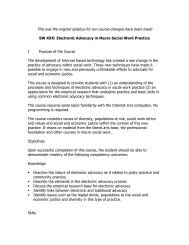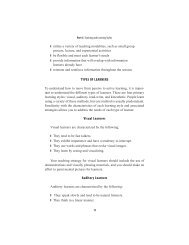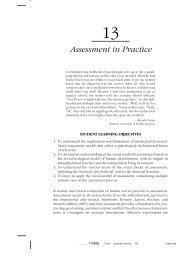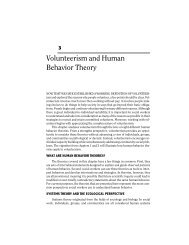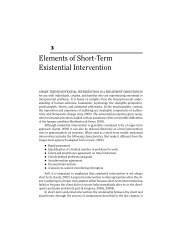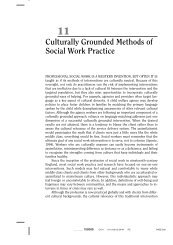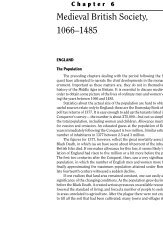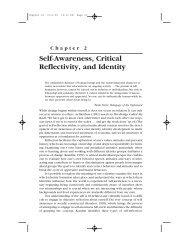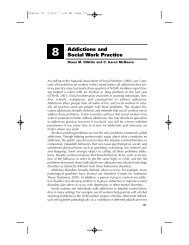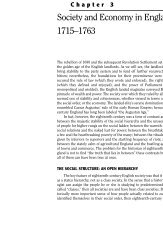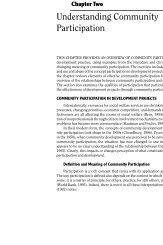Social Work's Historical Relationship to Volunteerism - Lyceum Books
Social Work's Historical Relationship to Volunteerism - Lyceum Books
Social Work's Historical Relationship to Volunteerism - Lyceum Books
You also want an ePaper? Increase the reach of your titles
YUMPU automatically turns print PDFs into web optimized ePapers that Google loves.
Chapter 5 <strong>Social</strong> Work’s <strong>His<strong>to</strong>rical</strong> <strong>Relationship</strong> <strong>to</strong> <strong>Volunteerism</strong> 71<br />
<strong>Social</strong> work simply does not have its own theoretical knowledge base. For example,<br />
systems theory emerged from the field of biology; the ecological perspective<br />
is derived from anthropology, sociology, and psychology; life course theory is rooted<br />
in psychology and sociology; and social exchange theory evolved from psychology,<br />
anthropology, and economics (Robbins et al., 1998). Therefore, in this regard,<br />
Flexner was and is still correct in his assessment: the fields of professional social<br />
work are <strong>to</strong>o numerous and diverse <strong>to</strong> identify or rely upon a single disciplinespecific<br />
knowledge base. With this in mind, there are three important questions <strong>to</strong><br />
consider concerning social work’s relationship with volunteers: Should social workers<br />
continue searching for discipline-specific knowledge? Does social work need its<br />
own theoretical knowledge base <strong>to</strong> qualify as a profession? And how has social<br />
work’s relationship with volunteers been affected by the profession’s search for its<br />
own body of knowledge?<br />
While social work has gained professional status by developing a unified code<br />
of ethics, establishing social work licensure and credentials, and implementing an<br />
agreed-upon criteria for social work education, it has been unable <strong>to</strong> develop a specialized<br />
body of knowledge. The inability <strong>to</strong> develop knowledge that is unique <strong>to</strong><br />
social work is not the result of a lack of effort. In fact, many social workers remain<br />
preoccupied with the search. In some cases, social workers have attempted <strong>to</strong><br />
claim different theories <strong>to</strong> be primary <strong>to</strong> social work practice. For example, Robinson<br />
(1931) advocated the psychoanalytic contributions <strong>to</strong> social work practice, Hollis<br />
(1970) the psychosocial approach, Smalley (1970) the functional approach,<br />
Thomas (1973) behavioral modification, and Saleebey (2002) the strengths perspective.<br />
Nevertheless, each theoretical framework is ultimately rooted in knowledge<br />
developed by another field. Other social workers have attempted <strong>to</strong> develop a<br />
unique social work knowledge base through scientific research. For example, Thyer<br />
(2002) candidly admits having spent his entire career searching for social work’s<br />
unique knowledge base. After twenty-five years, he has reluctantly come <strong>to</strong> the conclusion<br />
that it is impossible <strong>to</strong> identify unique social work contributions in any<br />
given area of practice research.<br />
The fact that social work cannot claim a unique theoretical knowledge base<br />
doesn’t necessarily mean social work is not a profession. What it does mean is that<br />
the profession must decide how much credence it will continue <strong>to</strong> give <strong>to</strong> Flexner’s<br />
presentation. The time has come for social work <strong>to</strong> leave Flexner behind. By all<br />
other indica<strong>to</strong>rs, social work is seen by society as a profession. There is no need for<br />
social work <strong>to</strong> continue evaluating its status other than for self-serving purposes.<br />
Yet at various points over the past three decades, major social work journals have<br />
published articles and entire issues dedicated <strong>to</strong> assessing social work’s professional<br />
status. In each case there is usually some mention of Flexner’s influence on the profession<br />
and in some cases his presentation is the focal point (see, e.g., Austin, 1983;<br />
Goldstein, 1990; Reamer, 1994; Thyer, 2001, 2002).<br />
Flexner (1915) himself questioned his own ability <strong>to</strong> assess social work. He



